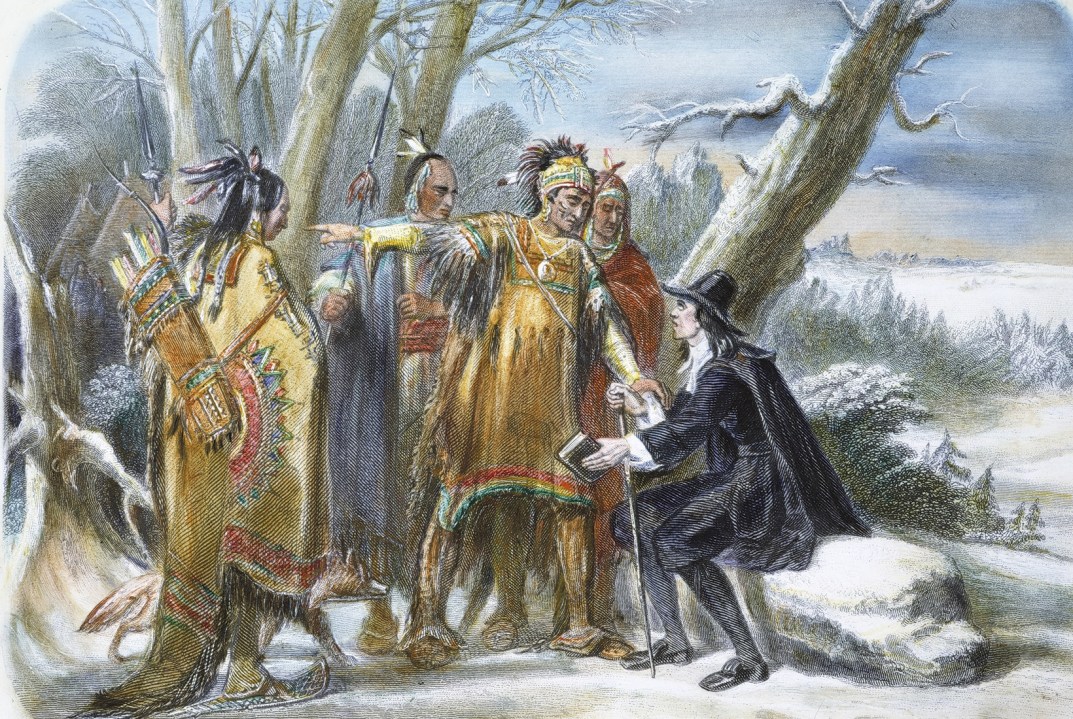The Mayflower’s journey did not simply end with landfall at Plymouth Rock, if indeed it ever arrived there in the first place — John Turner points out that no mention was made of the rock for 150 years after the Pilgrims disembarked; but the little ship has continued its voyage into mythology ever since. At the end of The Great Gatsby, Scott Fitzgerald writes of that ‘transitory enchanted moment’ when human beings came face to face with something commensurate with their capacity for wonder.
The Pilgrims gave substance and longevity to that transitory vision when they set up their community in the wilderness. Ten years later the Arbella arrived just a short way up the coast with its own elevated sense of destiny: their community would be ‘a city on a hill’, as Governor John Winthrop put it. But it’s the Mayflower passengers, that shipload of carpenters, weavers, coopers and merchants, who have the prior claim on our imagination.
As a result, their adventure has received plenty of coverage over the years. In 2006 Nathaniel Philbrick published Mayflower, a history that covers almost exactly the same time span as Turner’s book, from early days in England and Leiden, to the transatlantic crossing, the settlement at New Plymouth and the trials and tribulations of the colony, culminating late in the 17th century in the savagery of King Philip’s War. Turner’s rather odd title, a quotation from Plymouth Colony’s long-serving governor William Bradford, is also the title of Philbrick’s first chapter.
The Pilgrims relentlessly persecuted any fellow Puritan who differed in matters of theology
It is the subtitles, however, that show how the two books diverge. Philbrick’s is ‘A Voyage to War’, and his book is a sinewy account of the endless conflicts, double-dealing, massacres and battles that took place between the settlers and the Natives who happened to inhabit this so-called wilderness before the Mayflower ever dropped anchor.
Turner admittedly gives plenty of space to the same sorry story too. There is a gut-wrenching account of the Mystic River massacre of Pequot Indians in 1638 — their burning flesh gave off a ‘sweet savor’, according to Governor Bradford — an atrocity that had its counterpart nearly 40 years later in King Philip’s War, when the United Colonies of New England burned down a Narragansett fort, killing hundreds of Natives and their families. The women had been preparing a meal — ‘they and their mitchin [meat] fried together,’ joked one Plymouth Colony minister. But Turner is more interested in another dimension, as his own subtitle makes clear: ‘Plymouth Colony and the Contest for American Liberty.’
Of course, liberty can mean different things to different people, as the author frequently insists. He itemises gospel liberty, Christian liberty, liberty of conscience, political liberty and the liberty to live as one pleases. Roger Williams, who passed through Plymouth on his way to creating his own colony of Rhode Island, managed to travel from the minimalist definition at one end of this sequence to the laissez faire one at the other: ‘Williams’s own intolerance and zeal led him to embrace religious liberty’ (including the liberty not to worship at all). He had separated himself off from so many creeds and churches that he was left with a sort of individualism. This was not a route followed by the Plymouth leadership, who found ‘soul liberty’ repugnant. They endorsed only the first two definitions, though with the proviso that Christian liberty should refer exclusively to their particular Puritan stance.
Turner pays sympathetic attention to those rebellious spirits who defied the colony’s constraints — Thomas Morton, for example, who set up a maypole at Merry- mount and briefly became a ‘Lord of Misrule’ until the Plymouth militia leader Myles Standish (‘Captain Shrimp’, Morton called him) attacked the mini-Arcadia and took him into custody. There were always plenty of members of the awkward squad — ‘salamanders’, according to the Pilgrims, creatures that live in fire. These included the usual reprobates and eccentrics, of course, as well as fellow Puritans who differed on various matters of theology, and above all Quakers, whom the Pilgrims and Massachusetts Bay colonists relentlessly persecuted for many years. ‘The Pilgrims,’ Turner points out, ‘preserved their own liberty by denying it to others.’
What Turner achieves, in what will surely become the definitive history of the Plymouth Colony, is a double perspective. He provides lucid expositions of the Pilgrims’ beliefs and the reasons for them. He is excellent at exploring the paradoxes of Calvinist determinism (though concedes that the Congregationalists themselves never resolved them fully) and deftly untangles knotty concepts such as Arminianism and the Halfway Covenant. He allows us to admire the Pilgrims’ persistence, endeavour and energy, as against all odds they kept their community going for more than 70 years, while giving a clear-eyed assessment of their intolerance and occasional inhumanity.







Comments